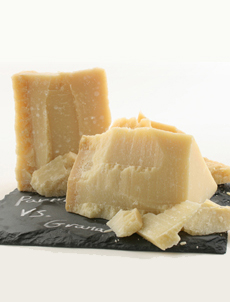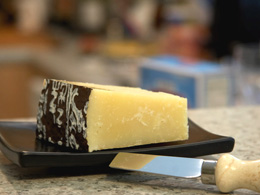

There are three prominent Italian grating cheeses: Asiago, Grana Padano and Parmigiano Reggiano. Above left, Parmigiano; right, Grana Padano. Cheese available from iGourmet.
|
STEPHANIE ZONIS focuses on good foods and the people who produce them. KAREN HOCHMAN is Editorial Director of THE NIBBLE.
|
|
September 2007
Last Updated July 2012
|
 |
Grating Cheeses: It’s Great To Grate
Page 3: Comparison Of Asiago, Grana Padano, Parmesan & Pecorino Cheeses
This is Page 3 of an eight-page article on grating cheeses. Click on the black links below to visit other pages.
Comparing The Cheeses
What’s the difference between Parmesan and Grana Padano? When would you use Asiago or Pecorino Romano? Here’s an easy-to-view comparison chart. We’ll go into depth on all of the cheeses on successive pages (see the article index above).
| Cheese |
Style |
Price/Pound† |
Parmigiano-Reggiano
Cow’s Milk |
Considered by many to be the top grating cheese for its complexity of flavors, it is also saltier and costlier than its cousin, Grana Padano. For those with money, Vacche Rosse is the supreme Parmigiano, priced higher and worth it.
CHOOSE THIS IF you are serving the cheese in a dish where its complex, nutty flavors can stand out—i.e., they won’t be drowned out or covered up by the preparation. Think risotto, carpaccio or light pasta preparations.
|
$13.00 to $20.00, according to age; Vacche Rosse $25.00 |
Grana Padano
Cow’s Milk |
Grana is sweeter (less salty) and subtler (less complex) than Parmigiano, but most people wouldn’t know the difference. For the money, a good Grana is a value cheese—and many restaurants use it instead of Parmigiano-Reggiano.
CHOOSE THIS IF you want “value Parmigiano,” or if you want a Parmigiano-like flavor but with less less sharpness and saltiness. Italians know a bargain: Grana Padano is the best-selling hard cheese in Italy. |
$12.00 to $13.00 |
Asiago
Cow’s Milk |
While the first three can be eaten as table cheeses, with a glass of wine, only Asiago could be mistaken for a table cheese, with buttery notes and normal levels of salinity. While a hard cheese, it has a much softer paste than the other three cheeses, more the consistency of an aged cheddar. (There is also a lesser-aged version of Asiago, Mezzano, made for eating.)
CHOOSE THIS IF you want a sweet, buttery grating cheese without significant saltiness. Asiago cubes nicely for a salad. |
Vecchio (aged up to 9 months), up to $16.99
Mezzano (3 to 5 months), $11.00 to $13.00) |
Pecorino Romano
Sheep’s Milk |
Sharp and salty, only a true salt lover would want to eat most of these as a table cheese, except for the few “genuine” Pecorinos still made in Rome, not Sardinia. The saltiness makes it an excellent grating cheese: no more seasoning is needed.
CHOOSE THIS IF you like sharp, salty flavors, appreciate a bargain, or are lactose-intolerant—sheep’s milk is much more easily digestible. |
$9.00 to $10.00 |
†Prices will vary by region and retailer.
 Deciding on which of these cheeses to purchase may ultimately come down to your unique taste buds. Will you be pairing it with wine and bread, cubing it for a salad, mixing it into a recipe? While this article focuses on grating, these cheeses make for a quick, rustic meal when matched with wine, bread, salami and fruit. See the websites in the Sources Section for recipes for each cheese. Deciding on which of these cheeses to purchase may ultimately come down to your unique taste buds. Will you be pairing it with wine and bread, cubing it for a salad, mixing it into a recipe? While this article focuses on grating, these cheeses make for a quick, rustic meal when matched with wine, bread, salami and fruit. See the websites in the Sources Section for recipes for each cheese.
These are great cheeses: Keep experimenting to see which you like best for what purposes. No matter which of these cheeses you select, you’ll be consuming a food with a venerable past, made by artisans who care passionately about it and cherished by consumers. Even a small quantity of a high-quality, flavorful grated cheese goes a long way in a dish, meaning that you’ll be able to stretch your dollar with these harder-textured favorites. So grab your grater and be prepared for some “grate” food!
Photo of Pecorino Romano courtesy of PDPhoto.org.
Continue To Page 4: Parmigiano-Reggiano Cheese
Go To The Article Index Above
Lifestyle Direct, Inc. All rights reserved. Images are the copyright of their respective owners.

|



 Deciding on which of these cheeses to purchase may ultimately come down to your unique taste buds. Will you be pairing it with wine and bread, cubing it for a salad, mixing it into a recipe? While this article focuses on grating, these cheeses make for a quick, rustic meal when matched with wine, bread, salami and fruit. See the websites in the
Deciding on which of these cheeses to purchase may ultimately come down to your unique taste buds. Will you be pairing it with wine and bread, cubing it for a salad, mixing it into a recipe? While this article focuses on grating, these cheeses make for a quick, rustic meal when matched with wine, bread, salami and fruit. See the websites in the